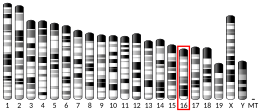Kalirin, also known as Huntingtin-associated protein-interacting protein (HAPIP), protein duo (DUO), or serine/threonine-protein kinase with Dbl- and pleckstrin homology domain, is a protein that in humans is encoded by the KALRN gene.[5][6] Kalirin was first identified in 1997 as a protein interacting with huntingtin-associated protein 1.[5] Is also known to play an important role in nerve growth and axonal development.[7]
Kalirin is a member of the Dbl family of proteins and is a Rho guanine nucleotide exchange factor.
It is named after the multiple-handed Hindu goddess Kali for its ability to interact with numerous other proteins. Kalirin's other name, DUO, comes from the fact that it is 98% identical to rat DUO protein and 80.6% identical to a human protein named TRIO. Unlike TRIO, which is expressed in numerous tissues, Kalirin isoforms are mainly found in the brain.
- ^ a b c GRCh38: Ensembl release 89: ENSG00000160145 – Ensembl, May 2017
- ^ a b c GRCm38: Ensembl release 89: ENSMUSG00000061751 – Ensembl, May 2017
- ^ "Human PubMed Reference:". National Center for Biotechnology Information, U.S. National Library of Medicine.
- ^ "Mouse PubMed Reference:". National Center for Biotechnology Information, U.S. National Library of Medicine.
- ^ a b Cite error: The named reference
pmid9285789was invoked but never defined (see the help page). - ^ Cite error: The named reference
pmid10023074was invoked but never defined (see the help page). - ^ Cite error: The named reference
pmid15923627was invoked but never defined (see the help page).



